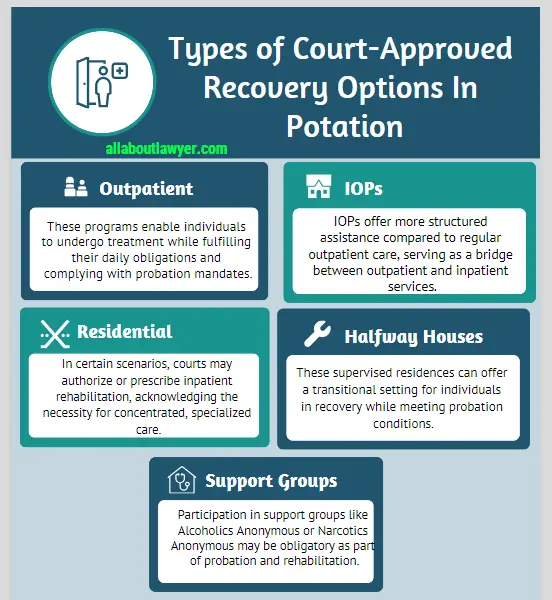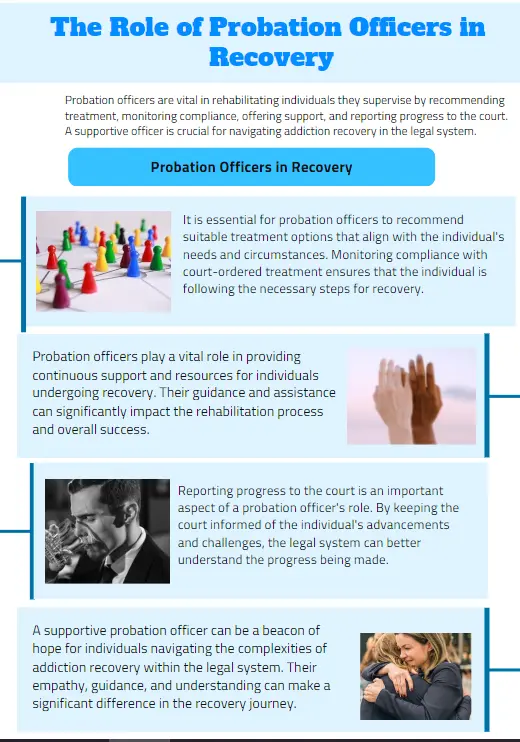Can You Go to Rehab While on Probation? Your Rights, and the Path to Recovery
When individuals find themselves on probation due to legal issues, often related to substance abuse, a common question arises: Can you go to rehab while on probation? This comprehensive guide will explore the possibilities, challenges, and considerations surrounding addiction treatment during supervision and court-ordered rehabilitation options for those under legal monitoring.
Table of Contents
Understanding Probation and Its Restrictions
Before delving into the can you go to rehab while on probation and specifics of rehabilitation during legal monitoring, it’s crucial to understand what probation entails. Probation is a period of supervised release granted by the court as an alternative to incarceration. During this time, individuals must adhere to certain conditions set by the court and their probation officer. These conditions may include:
1. Regular check-ins with a probation officer
2. Drug and alcohol testing
3. Maintaining employment or attending school
4. Restrictions on travel
5. Avoiding further legal infractions
Given these restrictions, the question of whether one can pursue addiction recovery under court order becomes complex and highly dependent on individual circumstances.
Related Articles For You:
Can-you-go-to-canada-with-a-dui
The Intersection of Probation and Rehabilitation
The good news is that in many cases, not only is it possible to attend rehab while on probation, but it may also be encouraged or even mandated by the court. The judicial system increasingly recognizes the value of substance abuse recovery while monitored as a means of addressing underlying issues that may have contributed to the original offense.
Types of Court-Approved Recovery Options In Potation
Several types of probation-compatible rehab programs may be available to individuals under legal oversight:
1. Outpatient Programs:
These allow individuals to receive treatment while maintaining their daily responsibilities and adhering to probation requirements.
2. Intensive Outpatient Programs (IOPs):
Offering more structured support than standard outpatient care, IOPs can provide a middle ground between outpatient and inpatient treatment.
Read also:
How many times can a dui case be postponed
3. Residential Treatment:
In some cases, courts may approve or even mandate inpatient rehabilitation, recognizing the need for intensive, focused care.
4. Halfway Houses:
These supervised living environments can provide a transitional space for individuals in recovery while adhering to probation requirements.
5. Court-Mandated Support Groups:
Attendance at support groups like Alcoholics Anonymous or Narcotics Anonymous may be required as part of probation and rehabilitation.

The Benefits of Rehabilitation During Probation
Pursuing addiction treatment during supervision can offer several advantages:
1. Demonstrating Commitment to Change:
Voluntarily seeking treatment can show the court and probation officers a genuine desire for rehabilitation.
2. Addressing Root Causes:
Substance abuse often underlies criminal behavior. Treatment can help individuals tackle these core issues.
3. Potential for Reduced Sentencing:
In some cases, successful completion of a rehabilitation program may lead to reduced probation terms or other legal benefits.
4. Improved Long-term Outcomes:
Addressing addiction issues can reduce the likelihood of future legal troubles and improve overall quality of life.
Read also: Do Bank Account With Beneficiaries Have To Go Through Probate
Challenges and Considerations
While pursuing rehabilitation while legally restricted can be beneficial, it’s not without challenges:
1. Scheduling Conflicts: Balancing treatment with probation requirements, work, and other obligations can be complex.
2. Financial Considerations: The cost of treatment may be a concern, though some programs offer sliding scale fees or accept insurance.
3. Travel Restrictions: Probation often limits travel, which may impact treatment options, especially for specialized programs.
4. Maintaining Compliance: It’s crucial to ensure that any treatment program aligns with all probation requirements to avoid legal complications.
Handling the Process | Steps to Take When You Go For Rehab While On Probation
If you’re considering rehabilitation while on probation, here are some steps to the process:
1. Communicate with Your Probation Officer:
Discuss your desire for treatment openly with your probation officer. They can provide guidance on approved options and necessary procedures.
2. Seek Legal Advice:
Consult with your attorney to understand how pursuing treatment might impact your legal situation.
3. Research Court-Approved Programs:
Look into rehabilitation centers that have experience working with individuals on probation and understand legal compliance requirements.
4. Obtain Necessary Approvals:
Ensure you have all required permissions from the court and your probation officer before entering a program.
5. Maintain Open Communication:
Keep your probation officer informed of your progress throughout the treatment process.
The Role of Probation Officers in Recovery
Probation officers play a crucial role in the rehabilitation process for individuals under their supervision. Their responsibilities often include:
1. Recommending appropriate treatment options
2. Monitoring compliance with court-ordered treatment
3. Providing support and resources for recovery
4. Reporting progress to the court
A supportive probation officer can be a valuable ally in Handling the complexities of addiction recovery within the legal system.

Legal Considerations and Rights
It’s important to understand your legal rights and responsibilities when pursuing treatment while on probation:
1. Confidentiality: While treatment providers must maintain confidentiality, they may be required to report certain information to probation officers or the court.
2. Medication-Assisted Treatment: If you’re prescribed medications as part of your treatment, ensure this is approved and documented with your probation officer.
3. Program Completion Requirements: Understand what constitutes successful completion of a court-mandated program and the consequences of non-completion.
4. Probation Violations: Be aware of how entering or leaving a treatment program without approval could potentially violate probation terms.
Success Stories and Outcomes
Many individuals have successfully completed rehabilitation programs while on probation, leading to positive outcomes in both their recovery and legal situations. Success stories often highlight:
1. Reduced recidivism rates
2. Improved relationships with family and community
3. Enhanced employment opportunities
4. Personal growth and increased self-esteem
These success stories underscore the potential benefits of pursuing treatment even under the constraints of probation.
The Future of Probation and Rehabilitation
The landscape of probation-sanctioned rehabilitation continues to evolve. Emerging trends include:
1. Increased Focus on Treatment: Many jurisdictions are prioritizing rehabilitation over punitive measures for substance-related offenses.
2. Technology Integration: Telehealth and remote monitoring technologies are expanding access to treatment for probationers.
3. Specialized Courts: Drug courts and other specialized judicial programs are becoming more common, offering tailored approaches to rehabilitation within the legal system.
4. Evidence-Based Practices: There’s a growing emphasis on utilizing scientifically proven treatment methods in court-approved programs.
Conclusion
The journey of recovery is challenging under any circumstances, and Handling it while on probation adds an extra layer of complexity. However, with the right approach, support, and understanding of the legal landscape, it is not only possible but often encouraged to pursue rehabilitation while under legal supervision.
By taking proactive steps towards recovery, individuals on probation can demonstrate their commitment to positive change, address underlying issues contributing to their legal troubles, and pave the way for a healthier, more stable future. The key lies in open communication with legal authorities, careful selection of appropriate treatment programs, and a steadfast commitment to both recovery and legal compliance.
Remember, every situation is unique, and it’s crucial to consult with legal professionals and addiction specialists to determine the best course of action for your specific circumstances. With the right support and determination, rehabilitation during probation can be a powerful step towards lasting recovery and a fresh start.
Related Articles For You:
How Much Does Probate Cost in Minnesota?
18 Questions to ask a probate lawyer before hiring
FAQs
Will entering rehab violate my probation terms?
Not necessarily. In many cases, pursuing rehabilitation is encouraged or even mandated. Always consult with your probation officer and obtain necessary approvals before entering a program.
Can my probation officer force me to go to rehab?
If substance abuse treatment is a condition of your probation, yes. However, the specific type of treatment may be negotiable. Discuss options with your probation officer and attorney.
How do I find a rehab program that’s compatible with my probation requirements?
Consult with your probation officer for a list of approved programs. Many treatment centers have experience working with individuals on probation and can help ensure compliance with legal requirements.
Will my insurance cover rehab while I’m on probation?
Many insurance plans cover substance abuse treatment, regardless of probation status. Check with your insurance provider and consider seeking programs that offer sliding scale fees if needed.
What happens if I relapse while in a court-ordered rehab program?
The consequences can vary. It’s crucial to immediately inform your treatment provider and probation officer. In some cases, your treatment plan may be adjusted rather than facing immediate legal repercussions.
About the Author

Sarah Klein, JD, is an experienced estate planning attorney who has helped clients with wills, trusts, powers of attorney, and probate matters. At All About Lawyer, she simplifies complex estate laws so families can protect their assets, plan ahead, and avoid legal headaches during life’s most sensitive moments.
Read more about Sarah
